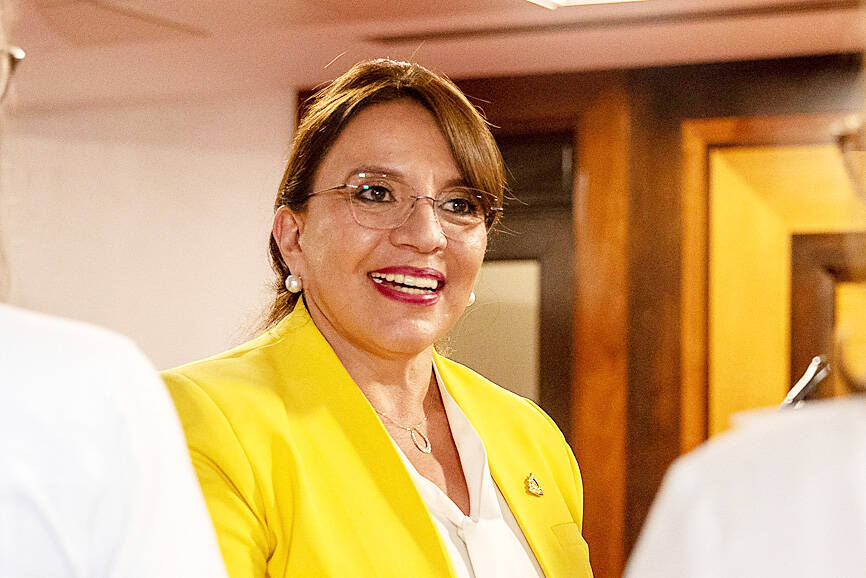Taiwan did much to help Honduran President Xiomara Castro and her family during a coup in 2009, former Taiwanese ambassador to Honduras Lai Chien-chung (賴建中) said yesterday in response to allegations that Taipei’s indifference at the time helped push the country toward Beijing.
Lai, who served as ambassador from 2006 to 2011, said that Taiwan was among very few countries that reached out to Castro, who was then first lady, when then-Honduran president Manuel Zelaya was ousted and sent into exile.
“We extended our utmost goodwill and efforts,” Lai said, adding that related correspondence can be found at the Ministry of Foreign Affairs.

Photo: AFP
Lai’s remarks came after former legislator Tsai Cheng-yuan (蔡正元) of the Chinese Nationalist Party (KMT) on Thursday said on Facebook that Taiwan refused to shelter Castro during the crisis and only helped her pregnant daughter.
Lai said that the coup took him by surprise, and he provided shelter to Castro’s husband and two daughters at his residence before the situation settled down.
Lai sheltered Castro at the US embassy separately to spread the risk, he said.
Castro often dined at Lai’s residence, he said, adding that relations with her were “very good.”
They remained friendly until Lai was dispatched to Italy in 2011, he said.
Castro drove hours to bid him farewell in person, putting him on the phone with Zelaya so he could thank Lai and Taiwan’s government for its support, Lai said.
Lai described the family’s stay at his house as an “act of trust.”
Castro’s daughter, Xiomara Zelaya, was a member of the diplomatic delegation Honduras dispatched to Beijing on Thursday to discuss the establishment of ties.
Castro on Tuesday last week wrote on Twitter that her country was considering diplomatic relations with China, but Honduras has not officially established ties with Beijing or severed them with Taipei.
Taiwan has yet to receive official communication from Honduras ending diplomatic relations, and is continuing efforts to salvage ties with the country, the Ministry of Foreign Affairs said.

POSITIVE DEVELOPMENT: Japan and the US are expected to hold in-depth discussions on Taiwan-related issues during the meeting next month, Japanese sources said The holding of a Japan-US leaders’ meeting ahead of US President Donald Trump’s visit to China is positive news for Taiwan, former Japan-Taiwan Exchange Association representative Hiroyasu Izumi said yesterday. After the Liberal Democratic Party’s landslide victory in Japan’s House of Representatives election, Japanese Prime Minister Sanae Takaichi is scheduled to visit the US next month, where she is to meet with Trump ahead of the US president’s planned visit to China from March 31 to April 2 for a meeting with Chinese President Xi Jinping (習近平). Japan and the US are expected to hold in-depth discussions on Taiwan-related issues during the

‘LIKE-MINDED PARTNER’: Tako van Popta said it would be inappropriate to delay signing the deal with Taiwan because of China, adding he would promote the issue Canadian senators have stressed Taiwan’s importance for international trade and expressed enthusiasm for ensuring the Taiwan-Canada trade cooperation framework agreement is implemented this year. Representative to Canada Harry Tseng (曾厚仁) in an interview with the Central News Agency (CNA) said he was increasingly uneasy about Ottawa’s delays in signing the agreement, especially as Ottawa has warmed toward Beijing. There are “no negotiations left. Not only [is it] initialed, we have three versions of the text ready: English, French and Mandarin,” Tseng said. “That tells you how close we are to the final signature.” Tseng said that he hoped Canadian Prime Minister Mark Carney

President William Lai (賴清德) yesterday bestowed one of Taiwan’s highest honors on Saint Vincent and the Grenadines (SVG) Ambassador Andrea Clare Bowman in recognition of her contributions to bilateral ties. “By conferring the Order of Brilliant Star with Grand Cordon on Ambassador Bowman today, I want to sincerely thank her, on behalf of the Taiwanese people, for her outstanding contribution to deepening diplomatic ties between Taiwan and SVG,” Lai said at a ceremony held at the Presidential Office in Taipei. He noted that Bowman became SVG’s first ambassador to Taiwan in 2019 and

A man walks past elementary school artworks at the Taipei Lantern Festival in Ximen District yesterday, the first day of the event. The festival is to run from 5pm to 10pm through March 15.